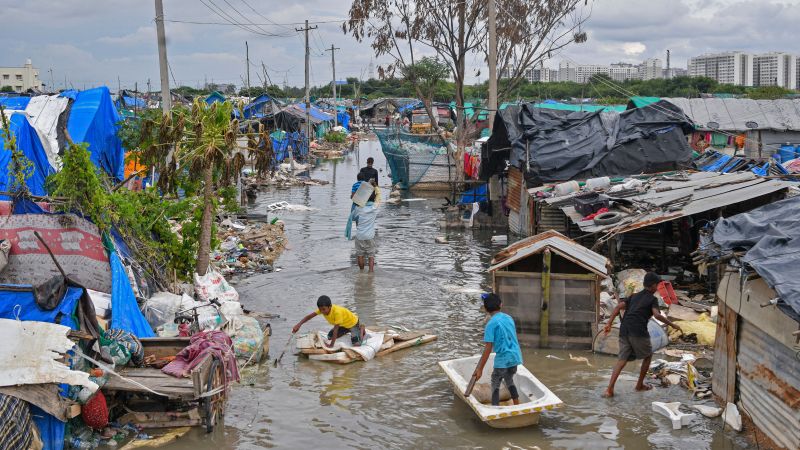






India is currently grappling with extreme weather events attributed to climate change, including unprecedented heatwaves, monsoon rains, and flooding. These climate impacts have significant global implications, as India stands as the world's third-largest emitter of greenhouse gases. Despite the urgency of the climate crisis, it remains a secondary issue in India's national election, where voter concerns are primarily focused on immediate livelihood and welfare needs. The intersection of climate politics in developing countries like India differs markedly from that in developed nations, where climate change often takes center stage in political discourse. [1b91a89f]
In recent years, India has made notable strides in implementing climate actions, such as electrifying its transportation sector, expanding renewable energy capacity, and modernizing its agricultural practices. These initiatives align with broader goals of transitioning to a low-carbon economy, yet challenges remain. Experts suggest that India could enhance its climate strategy by establishing a formal carbon pricing mechanism and accelerating the phase-out of coal and gas generation. The emphasis on immediate developmental goals often overshadows the long-term need for climate-proofing, underscoring the necessity for global cooperation and adaptation finance to effectively address climate impacts. [4515e921]
A recent analysis highlights the absence of institutional mechanisms in India for addressing climate change and the potential for climate justice. It explores whether the concepts of climate justice have been effectively translated into action within the country. The analysis emphasizes India's role in climate negotiations and the importance of establishing a legal framework for climate justice, raising critical questions about the country's readiness to tackle these challenges. [7959ca7b]
Michael Barnard presented a comprehensive list of climate actions at the India Smart Utility Week, advocating for strategies such as overbuilding renewable generation, building pumped hydro storage, and restoring ecosystems. He stressed the importance of finding a unique path for India to accelerate its transition to a sustainable economy. [8b5227b6]
As India faces record-breaking heat, with temperatures soaring above 118 degrees, the consequences of climate change are becoming increasingly evident. Workers in outdoor industries are particularly vulnerable to heat-related illnesses, and hospitals are struggling to cope with the influx of patients suffering from these conditions. This dire situation highlights the urgent need for effective climate action. [27c477d3]
In the United States, former President Donald Trump's potential return to power in the upcoming November 2024 election raises concerns about the future of global climate cooperation. Trump has a history of opposing climate change agreements, including his withdrawal from the 2015 Paris Climate Agreement. If he were to regain the presidency, experts warn that he might repeat this action, undermining international trust in climate agreements. In contrast, President Joe Biden restored the U.S. commitment to the Paris Agreement in 2020. Recent emissions data reveal that in 2022, China emitted 11.4 million tonnes of CO2, while the U.S. emitted 5 million tonnes, India 2.8 million tonnes, and other major emitters like Russia and Japan followed suit. Indonesia, for its part, aims to reduce emissions by 43.2% by 2030 and achieve net-zero by 2060, with support from USAID investing $71.8 million in climate efforts. Trump's return could significantly disrupt these global climate initiatives and cooperation efforts. [a7725ad0]
Geopolitical tensions, including the ongoing Ukraine war and the Israel-Gaza conflict, are also hindering climate action globally. Experts Varun Sivaram and Arun Sharma discussed on Radio Davos how these conflicts create a challenging backdrop for climate negotiations. Despite the declining costs of energy-transition technologies, such as solar power, and significant investments by China in solar technology, the global market is affected by trade tensions, particularly between the U.S. and China, which complicate critical minerals supply chains necessary for clean technology. The need for frameworks to assist the Global South in energy transitions is increasingly urgent, as the private sector plays a crucial role in advancing clean technology. Sivaram emphasized the importance of eliminating the North-South divide in climate action to foster a more equitable response to climate challenges. [20484287]